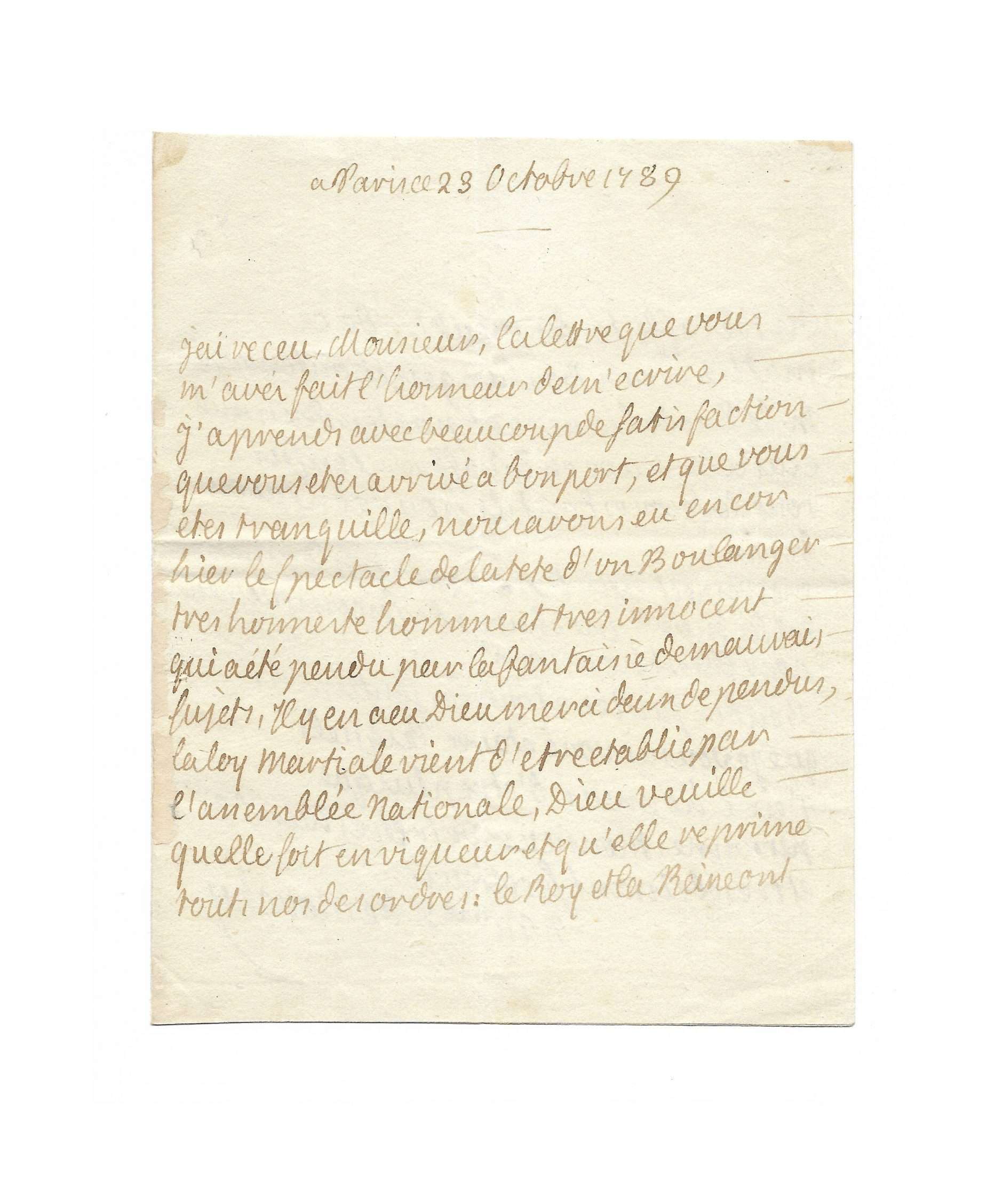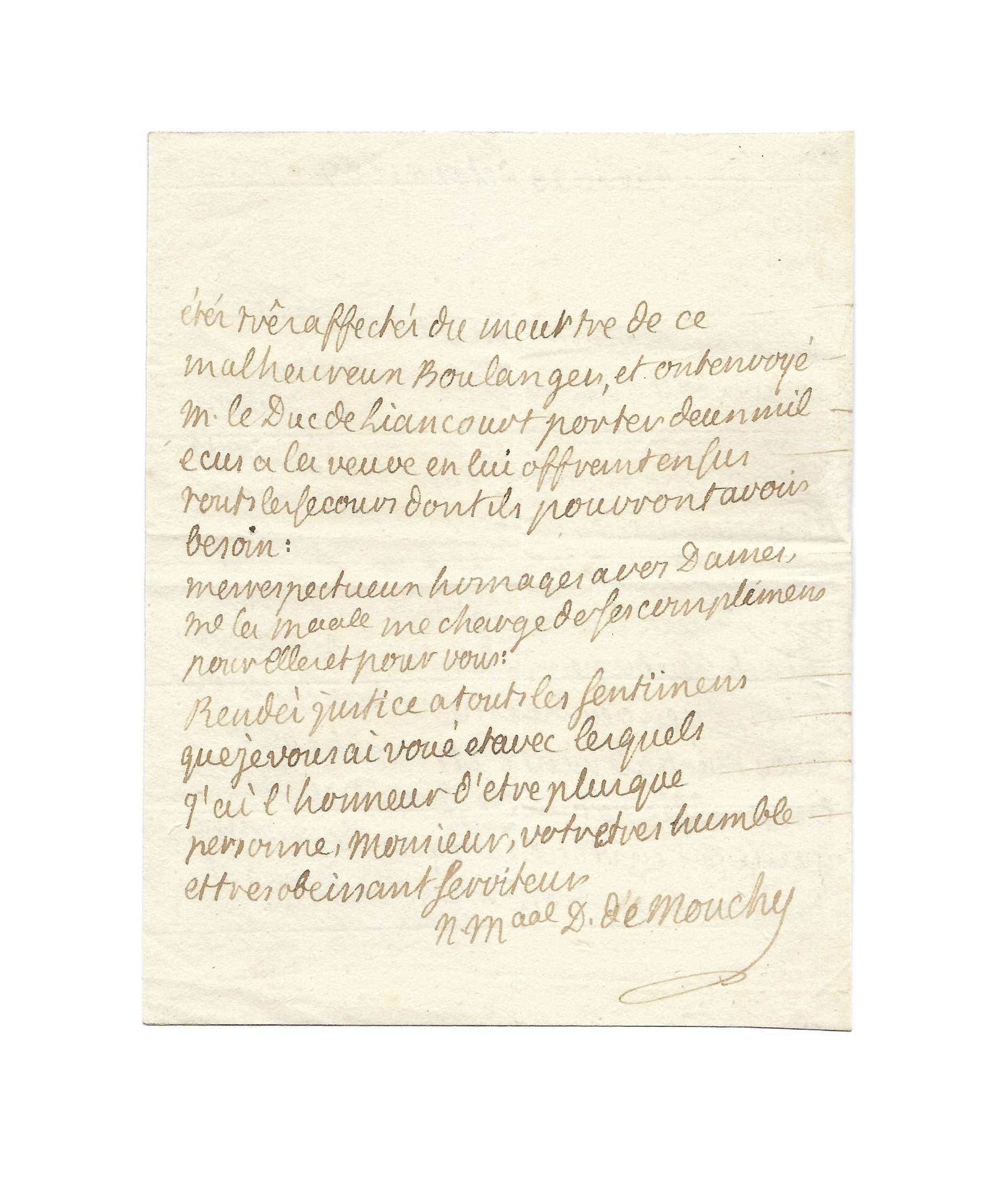MOUCHY, Philippe de Noailles, duc de (1715-1794)
Autograph letter signed “N. Mchal D. de Mouchy” to a gentleman
Paris, October 23, 1789, 2 pages in-8 on laid paper
“The sight of the head of a very honest man baker and very innocent who was hanged by the fantasy of bad subjects“
Fact sheet
MOUCHY, Philippe de Noailles, duc de (1715-1794)
Autograph letter signed “N. Mchal D. de Mouchy” to a gentleman
Paris, October 23, 1789, 2 pages in-8 on laid paper
Usual folds, old marks of montage on left margin with no incidence to the text
Historical letter on the murder of the baker Denis François, accused of being a hoarder, hanged and beheaded by the populace in place of Grève, an event which triggered the Martial law
“J’ai reçu, Monsieur, la lettre que vous m’avez fait l’honneur de m’écrire, j’apprends avec beaucoup de satisfaction que vous êtes arrivé à bon port, et que vous êtes tranquille, nous avons eu encor hier le spectacle de la tête d’un boulanger très honneste homme et très innocent qui a été pendu par la fantaisie de mauvais sujets. Il y en a eu Dieu merci, deux de pendus, la loy martiale vient d’être établie par l’assemblée nationale, Dieu veuille qu’elle soit en vigueur et qu’elle réprime touts nos désordres. Le Roy et la Reine ont étés très affectés du meurtre de ce malheureux boulanger, et ont envoyé M. le duc de Liancourt [François XII de la Rochefoucauld] porter deux mil écus à la veuve en lui offrant en sus tout les secours dont ils pourront avoir besoin:
Mes respectueux hommages a ses Dames, Me la Mchale me charge de ses compliments renouveler et pour vous:
Rendé justice à tous les sentiments que je vous ai voué et avec lesquels j’ai honneur d’etre plus que personne, monsieur, votre très humble et très obeissant serviteur.
N. Mchal D. de Mouchy”
Philippe de Noailles, Duke of Mouchy, was a French officer, elevated to the dignity of Marshal of France in 1775. His military career spanned from 1729 to 1759, and he participated in the War of the Succession of Poland and Austria. In 1755, Louis XV entrusted him with a diplomatic mission to Sardinia, then to the court of Parma. In 1770, he was commissioned by Choiseul, then the chief minister, to welcome Marie-Antoinette of Austria – the future queen of France – in Strasbourg. His wife was appointed lady-in-waiting of the dolphin, and then, after the death of Louis XV, first lady of honor of the queen who called her “Madame Étiquette”. The Duke and Duchess of Mouchy thus held a prominent position at the court of Louis XVI, until the resignation of the Duchess after the appointment of the Princess of Lamballe as superintendent of the Queen’s House.
After the events of 1789, unlike a number of nobles, the Duke of Mouchy remained in France, trying to protect Louis XVI from the revolutionary onslaught, until the insurrection of 10 August 1792 which saw the fall of monarchy. Caught up in the alleged conspiracy of prisons, he and his wife were sentenced to death by the Revolutionary Court on 27 June 1794. On this occasion he showed the same bravery and composure he had shown in the war under the reign of Louis XV.
Denis François (1761-1789) is a French baker. On October 21, 1789, two weeks after the Journées d’Octobre, a woman who had not been able to buy bread asked to visit his shop to make sure there were no hiding bread. She found three 4-pound loaves, one of which was stale, and one of 12 pounds. She leaved the shop with one of the 4-pound loaves and says the baker had hidden several. The crowd took over the baker who asks to be taken to the headquarters of the district, the officers of the district then took him to the Hotel de Ville. But the crowd snatched him from the guards and brought him to Place de Grève. He was then hung off of a lantern. Immediately after, a man beheaded him with his sword, which he wiped on the baker’s shirt. His head was then placed at the end of a spade. His widow, then pregnant, was forced to kiss her husband’s head before losing consciousness. His death led the National Constituent Assembly to decree martial law on 21 October, which aimed to quell riots and acts of violence. Those had been growing in number since 14 July. It was signed on the same day by Louis XVI, its promulgation was made the next day.
Very interesting document relating one of the turning points of the the French Revolution’s early days



